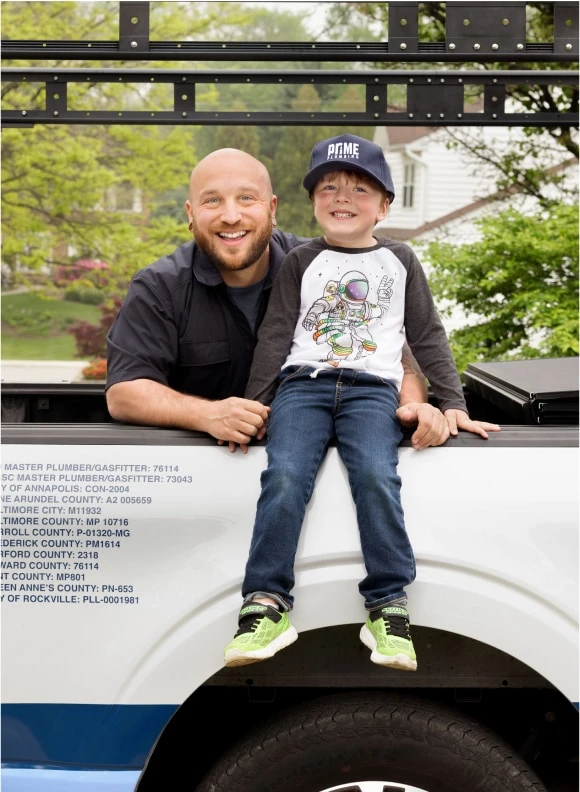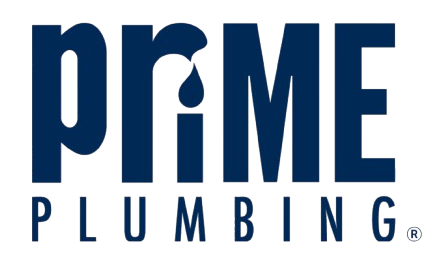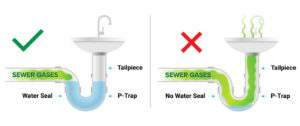Service 7 Days a Week

Proudly Serving Central Maryland
Don’t Let Plumbing Smells Be an Uninvited Guest This Thanksgiving

Save Time, Call Prime!
For many of us, thoughts of Thanksgiving evoke memories of delicious aromas wafting through our homes as we gather with friends and family. The scent of turkey roasting and other tantalizing smells signals togetherness, delectable food, and the onset of the festive season.
However, when the scents filling your home are less-than-pleasant, particularly those originating from your plumbing, it’s crucial to quickly pinpoint and address the cause to ensure your living environment is both healthy and great smelling!
Plumbing Smells & What They Mean
- Sewage: As organic household waste decomposes, it emits a mix of foul-smelling toxic and nontoxic gasses. Drains typically have a trap to prevent sewer gasses from escaping from the drain into your home. Over time, the water within your traps will evaporate causing the trap to dry out and lose its seal, especially in drains that are not frequently used, such as in a guest bathroom or seasonal home. If a p-trap loses its seal, sewer gas can flow up and out of the drain. Exposure to sewer gas can cause nausea, dizziness, fatigue, memory problems, and general confusion. Experts also warn that sewer gas is highly flammable, increasing the risk of explosion or fire.
Periodically pour water down seldom-used drains to prevent the p-trap from drying out and to maintain an airtight seal. If needed, a Prime professional plumber can quickly install a new p-trap and keep those nasty sewer gasses from entering your home.
- Rotten eggs: A pungent, foul odor resembling rotten eggs or sewage is a red flag that can signal a gas leak. The unpleasant sulfuric smell may indicate an emergency, as a gas leak can result in fire, carbon monoxide poisoning, or other serious illness. If you detect a rotten egg smell in your home, immediately contact your gas company and vacate the house. Don’t reenter your home until the gas company rules out a gas leak.
If it’s not a gas leak, a broken pipe or an electrical system issue may be causing the sulfuric odor. If you only detect this particular smell when running water, it may indicate an issue with your water heater. Contact a professional to pinpoint the problem. Always have functioning carbon monoxide detectors in your home to safeguard your loved ones.
- Chemicals: Sharp, chemical odors could mean that hazardous materials or substances have been improperly disposed of, or there may be a serious issue with your water supply.
- Musty or wet earth odors: Often indicative of mold or mildew, this scent suggests that there is persistent moisture in areas that should be dry. Mold and mildew most commonly appear in kitchens, bathrooms, and laundry rooms where warm, damp conditions encourage growth — such as behind toilets, under sinks, or in poorly ventilated, humid areas. Mold spores can cause serious respiratory and other health problems. Sneezing, coughing, headaches, fatigue, or worsening allergies or asthma, may be signs that you have mold.
How To Avoid Unwanted Plumbing Odors
As discussed, odors emanating from our home’s plumbing can signal the presence of toxic gasses that can harm the health of your family and may increase the risk of fire, explosion, or asphyxiation.
Of course, we’d all prefer to keep our homes safe and odor-free. The following tips will help you avoid, or at least minimize the risk, of unwanted plumbing odors.
- Be mindful of what goes down your drain. Never discard oil, food waste (even in your garbage disposal), or paper products, as these can cause unpleasant smells and may harm your pipes.
- Periodic flushing of your drains with hot water, small amounts of vinegar, and baking soda can keep things moving smoothly. The experts at Prime Plumbing strongly advise against the use of chemical drain cleaners which can severely damage your pipes.
- Conduct regular checks of visible pipes for signs of leaks, condensation, or corrosion.
- An annual inspection by a Prime or other professional plumber can be invaluable for uncovering hidden plumbing issues and preventing future problems.
- If you do smell an unpleasant odor in your drainage system, contact a professional plumber to diagnose and remedy the problem.
Trust your nose! Sniff out where the noxious odor is coming from and what it smells like — sewer stink, rotten eggs, chemicals, or wet earth, and describe the smell to your Prime plumbing expert. Prime Plumbing is always here to ensure you and your family are safe and your home is healthy. Save time, call Prime!
All of us at Prime Plumbing wish you a Thanksgiving filled with delightful aromas and joyful moments with loved ones. May your holiday be warm, fragrant, and full of gratitude.
The Difference With Prime
Get a FREE second opinion on water and sewer service, and septic repair/replacements!
Don’t Just Take Our Word for it

Why Choose Prime Plumbing?
Professional Services at an Affordable Price
- Transparent Pricing
- No Additional Charges for Overtime
- Flexible Financing Solutions
- Thorough Employee Background Checks
- Complimentary Second Opinions


